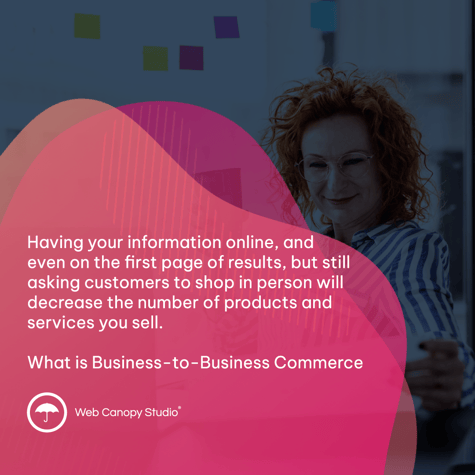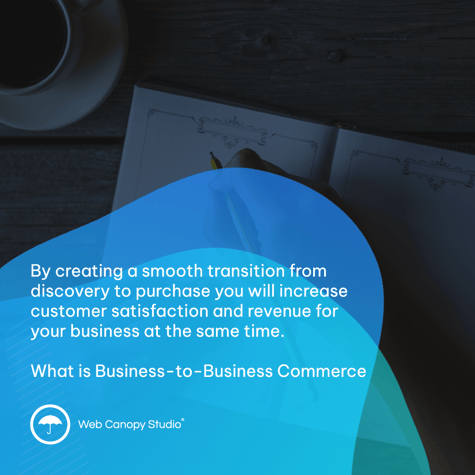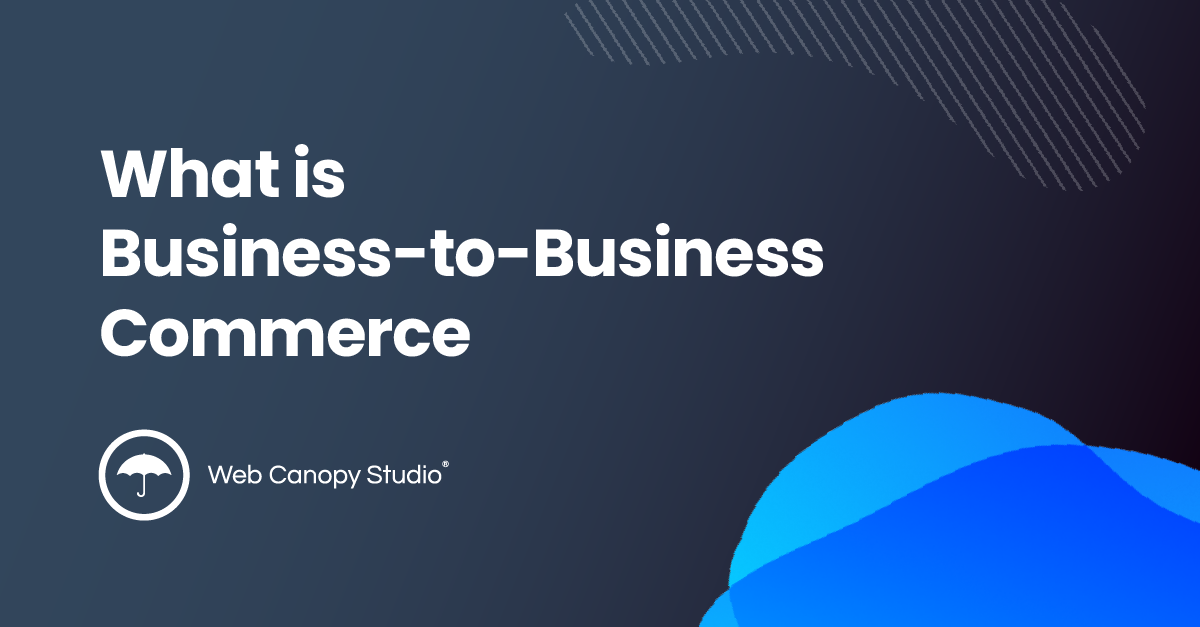In your everyday life, you make quite a few purchases. When you are buying something for your needs or wants from a business, this is a business-to-consumer transaction (B2C). Target runs, trips to the grocery store, back-to-school shopping, and getting a haircut are all examples of B2C exchanges. B2C exchanges take place between a business and an individual consumer.
Business-to-business transactions (B2B) are very similar, except the customer buying the goods is another business. These exchanges are from one business to another business.
Anytime products or services are sold from one business to another, it is a business-to-business transaction. Just like B2C transactions can happen in a variety of ways, B2B transactions can also happen in person, through a catalog, over the phone, or through online retailers. The transaction volume might be considerably more and the products can be different, but sales made in a business-to-business model are similar to ones in a business-to-consumer one.
Examples of Business-to-Business Commerce
The goods purchased in a business-to-business exchange can be the exact same items that consumers are buying in business-to-consumer transactions. What is being sold is less important than who is buying it. Multiple businesses cater to individual consumers and business customers. It is normal for a business to operate in the B2B and the B2C realms, though some will only specialize in business-to-business interactions.
The main categories of B2B sales are supplies, wholesale goods, services, and software.
Supplies
Any physical object you need for a business is a supply. These are often items you need for day-to-day operations or specialty items that are needed for business from time to time. Day-to-day supplies include:
- Writing utensils
- Hammers
- Paper
- Computers
- Work gloves
- Business cards
- Water bottles
Examples of products for infrequent use that are still needed and purchased from other businesses are:
- Holiday decor
- First aid kits
- Fire extinguishers
Supplies are often things that businesses need to operate and not items that a business sells. Typically items that are going to be sold by a business are purchased wholesale since anticipated sales are high.
Wholesale
Wholesale materials are similar to normal supplies, just in much larger quantities. Depending on the industry, some businesses will want a good that is considered a normal supply, and for others it will be advantageous to purchase it wholesale.
A small business clothing boutique will need cleaning supplies for routine cleaning, but because they don't specialize in cleaning, they likely won't need wholesale quantities of surface cleaners. A corporate cleaning company that performs after-hours cleaning of businesses would want cleaning supplies in bulk and their needs would be best met by wholesale products. While these items are the same, the amount needed will decide if a business needs a wholesale purchase or not.
Wholesale goods are frequently raw materials that are needed throughout the supply chain, such as:
- Lumber
- Metal ore
- Cotton
- Flour
- Wool
All wholesale goods are not necessarily raw materials though. You can buy finished products, such as plastic goods and processed paper goods, in wholesale quantities without buying the raw goods and making them yourself. Many businesses rely on these types of items but won't manufacture them themselves. For example, a restaurant that does a large amount of to-go orders would want plastic utensils in bulk and would not want the raw materials necessary to craft their own takeaway forks.
Another example would be goods for construction companies. They will buy lumber and metal that is already processed and shaped into what they need. They won't buy logs and unrefined metals and create their own products. They will likely want to buy these finished materials in wholesale quantities since they use many of them.
Wholesale business-to-business companies are beneficial because they often sell their products at a discounted rate since the businesses they are selling to are buying large quantities. While the discounts can be deep, it still isn't useful in the long run to buy items from wholesalers if you don't use them very often, which is why companies that sell small-batch supplies are still important in the business-to-business sector.
Services
Sales between businesses of any type are classified as B2B whether a physical object is traded or not. Some of the largest exchanges between businesses are in services, not raw materials or finished products. Examples include:
- Loans and accounts operated by financial services companies
- Utilities such as natural gas, electricity, and water
- Tasks outsourced to other businesses, such as HR services, business marketing, company website maintenance, or accounting
- Use of a job search platform
- Insurance
- Shipping at each step of the supply chain
- Renting space for trade conferences
- Cell phone service
Software
Software services are one of the fastest-growing business-to-business sectors. So much B2B business is done online that a myriad of software services are needed to help eCommerce function. Online storage, email, communication, information technology, entertainment, and more are all often attached to software services. Common Software service companies are:
- Dropbox
- Slack
- Netflix
- Spotify
- Microsoft
- Zoom
Everything from lobby music to key cards to cloud storage are the tangible day-to-day uses of a software service. Many of these transactions are subscription-based and purchased fully online.
As eCommerce continues to grow it is likely that software services will expand as well.

The Increase of eCommerce Within Business-to-Business Transactions
Business-to-Business online platforms have lagged quite a bit behind business-to-consumer online sites. Business-to-business companies are starting to get on board with online transactions though. A recent Forrester Report estimates that 17% of all B2B transactions are expected to happen online by the end of next year. That projection means that B2B revenue from eCommerce sites has more than doubled in a decade.
Benefits of Business-to-business eCommerce
The benefits of selling goods and services online are driving the shift to B2B eCommerce. eCommerce has been associated with higher profit margins and better customer experiences. Simply put, many business clients prefer to buy online from other businesses and this is creating more overall revenue.
Benefits to Customers
eCommerce provides a way to increase customer loyalty as expectations in the business-to-business sphere are shifting. Businesses purchasing goods are relying more on electronic commerce because it is easier and makes the whole process less time-consuming.
While company websites are useful in showcasing businesses, they are most useful when eCommerce takes place on them as well. You will sell products more effectively if there is a smooth transition from search engine results to purchases. Having your information online, and even on the first page of results, but still asking customers to shop in person will decrease the number of products and services you sell.
The versatility of shopping time is another bonus of eCommerce. You have the ability to remain open 24/7/365 with an online storefront. Many B2B eCommerce transactions will still take place during normal business hours, but with the increase of flexible online jobs, it is likely that some businesses will purchase products after 5:00 each day. If you rely entirely on a sales team or brick-and-mortar storefront you are limiting the hours a day a customer can shop, which can prevent someone from becoming a new customer.
Benefits to Businesses
Your business is likely to receive more visibility with an eCommerce platform. Technology makes it easier to reach your target audience. A quick click can connect potential consumers with your goods. Buyers are more likely to search for businesses to buy from online.
Another benefit of an online business model is increased cash flow. With an integrated payment processor, purchased products and services can be paid for immediately. This is preferred by the companies buying goods as well as the ones receiving the profit.
eCommerce can also provide your employees with more flexibility. You can move some workers to work-from-home positions, which increases employee satisfaction for many. B2B consumers require less face-to-face interaction with eCommerce than in-person purchasing. Even when they do need to talk with an employee, they can achieve a productive conversation online, over the phone, or on a video call. It isn't every employee's wish to work at home, but for the ones who would prefer that, eCommerce is a vehicle to allow more telework opportunities. This can increase employee retention.
Good product descriptions, quality customer service, and a user-friendly website or application will guarantee that you can make as positive of a first impression on online consumers as you can with in-person customers.

Business-to-Business Selling Made Easier
B2B transactions are sales that happen between two business entities and are often on a larger scale than B2C transactions. While sales continue to happen through various channels, eCommerce is the leading avenue for business-to-business transactions and is only expected to increase in revenue production share. Integrating an online business platform will simplify the sales process and bring in potential buyers.
B2B companies are now employing the assistance of software services to help manage the different strategies needed for a successful eCommerce business. Web Canopy Studio provides services to increase your B2B eCommerce sales. Book a call to discuss if our services are a good fit for your business.



